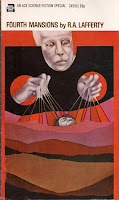R. A. Lafferty (1914-2002) was one of the most individual of SF writers. He began publishing in his mid 40s, with much of his early work appearing in Pohl’s magazines (Galaxy and If). His primary mode was the “tall tale”, and he attracted attention with the stories that appeared in his first collection, Nine Hundred Grandmothers, and then with his early novels, such as Past Master, Fourth Mansions, and The Devil is Dead. He appeared regularly in magazine and anthologies for a couple of decades, after which his work, which had either outworn its popular welcome or become too individual for a wide audience, mostly appeared in small press publications. I enjoyed a great many of his short stories, though I tended to find his novels a bit uneven, or a lot uneven.
Below are reviews of a few Lafferty stories I've reread recently in old magazine or anthologies, plus very short capsule reviews of two early novels.
If, September 1960
And finally, far and away the best story in this issue is Lafferty's "The Six Fingers of Time". I didn't recall the story though I've surely read it before: it was in Nine Hundred Grandfathers as well as a couple more anthologies. I would venture to say that it is the first really significant story Lafferty published. I liked it a great deal.
It opens with Charles Vincent waking up and discovering that time has nearly stopped for him. At first this is a source of puzzlement, then concern. But he does get caught up at work! Later he uses his advantage to pull silly tricks like undoing women's clothes (reminding me of Nicholson Baker's novel The Fermata). Eventually he learns a modicum of control over his power, and is approached by a shady man who seems to have much greater abilities in this area, and who talks of a link to extradigitalism (Vincent has a partial extra thumb). The end of the story is strong and mysterious, with references to the "smell of the pit", and a chance at much greater power -- but at what cost? And, of course, an eventual inevitable ending. Quite a fine piece of work.
Galaxy, April 1961
“All the People” is a very early Lafferty story. The voice is familiar, if not fully developed. The story is pretty good, if a bit more traditional than usual for Lafferty. It's about a person cruelly called “Tony the Tin Man”, he thinks because his father was a junk dealer. But in reality he's a “restricted person”, a cyborg attached to a computer, able to sense the feelings of all the people in the world, and so to detect if any are unexpected – perhaps invading aliens. And how would a “restricted person” react to an invasion?
Galaxy, August 1961
"Aloys" is a shortish Lafferty piece, decent and fairly characteristic work. The hero is a spectacular scientist, but naïve and poor and obscure, and when he is given an award he is subverted by a typically Laffertian secret society. It's best for its portrayal of Aloys himself.
The Reefs of Earth
 |
| (Cover by Richard Powers) |
Fourth Mansions
 |
| (Cover by Leo and Diane Dillon) |
New Dimensions II
“Eurema’s Dam” is in the “tall tale” dimension. Eurema is a Greek word that means, roughly, “invention”, so the title means, “mother of invention”, and the theme is, more or less, “stupidity is the mother of invention”. The hero is Albert, “the last of the dolts”. Because he isn’t smart enough to do anything himself, he keeps inventing machines to do things for him. Of course, it turns out that those machines are useful for lots of other people as well. So Albert gets rich. But he doesn’t really care about that. And what really ends up bothering him is that the machines he creates think he’s a dolt, too, and when they take over … well, you see where it’s going. It’s a fun enough story, but it doesn’t have the true inspiration, the magic, that I find in his best stories.
Odyssey, Summer 1976
And Lafferty's story, "Love Affair with Ten Thousand Springs", is pretty characteristic of him, about a man who loves springs and their "pegeids" (analogous to naiads). They are all imperfect, and the pegeid at the center of this story turns out to be imperfect in a scary way. Plenty of linguistic invention and verve, but probably a bit too long, too rambling. Minor Lafferty, really.
No comments:
Post a Comment